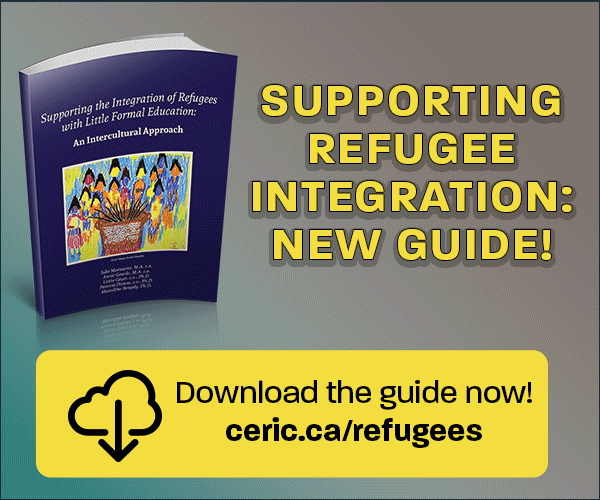Relentless Accountabilities and Co-’authoring’ our Professional Lives
Keywords:
accountable, professional, professionAbstract
This article summarizes activities from a workshop on the career development of counsellors. The perspective taken is borrowed from narrative psychology and therapy, and the workshop’s activities are seen as “re-authoring” opportunities. These opportunities arise from questions, answered in pairs, designed to promote reflection and decision-making on aspects of practice germane to experienced counsellors. Counselling is portrayed as a profession where we are expected to balance accountabilities, including those we have to ourselves, and our most important non-work relationships. Narrating the story of our professional life is therefore one in which our ’authorship’ in all areas of accountability is required.
References
Adams-Westcott, J. & Isenbart, D. (1995). A journey of change through connection. In S. Friedman (Ed.). The reflecting team in action. (pp. 331-352). New York: Guilford.
Berger, M. (1995) Sustaining the professional self: Conversations with senior psychotherapists. In M. Sussman (Ed.) A perilous calling: The hazards of psychotherapy
practice. (pp. 302-321). New York: John Wiley & Sons.
Beutler, L. E. (2000). David and Goliath: When empirical and clinical standards of practice meet. American Psychologist, 55, 997- 1077.
Blatner, A. & Blatner, A. (1996). The art of play: Helping adults reclaim imagination and spontaneity. (Revised edition). New York: Brunner-Mazel.
Bruner, J. (1992). Acts of meaning. Cambridge, MA: Harvard University Press.
Cochran, L. & Savickas, M. (1997). Career counseling: A narrative approach. Thousand Oaks, CA: Sage.
Dass, R. & Gorman, P. (1985). How can I help? Stories and reflections on service. New York: Knopf.
Deutsch, C.J. (1985). A survey of therapists’ personal problems and treatment. Professional Psychology: Research and Practice, 16, 305-315.
Duncan, B. & Miller, S. (2000). The heroic client. San Francisco: Jossey Bass.
Epston, D. (1992). Temper tantrum parties, facing face, losing face or going off your face. In D. Epston & M. White (Eds.). Experience, contradiction, narrative and imagination: Selected papers of David Epston & Michael White 1989- 1991 (pp. 37-74). Adelaide, Australia: Dulwich Centre Publications.
Epston, D. (1993). Internalized other questioning with couples: The New Zealand version. In S. Gilligan & R. Price (Eds.) Therapeutic conversations. (pp. 183-190). New York: Norton.
Epston, D. (1994). Extending the conversation. Family Therapy Networker, 18 (6), 31-37 & 62-63.
Eron, J. & Lund, T. (1996). Narrative solutions. New York: Guilford.
Figley, C.R. (Ed.). (1995). Compassion Fatigue: Coping with secondary traumatic stress disorder in those who treat the traumatized. New York: Brunner Mazel.
Flavell, J. (1977). Cognitive development. Englewood Cliffs, N.J.: Prentice Hall.
Gergen, K. (1999). An invitation to social constructionism. Thousand Oaks, CA: Sage.
Grosch, W. & Olsen, D. (1994). When helping starts to hurt. New York: Norton.
Haley, J. (1987). Problem-solving therapy. (2nd Edition). San Francisco: Jossey-Bass.
Hansen, P. (1985). The joy of stress. (2nd Edition Revised). Islington, Ontario: Hanson Stress Management Organization.
Helm, J.J. (Ed.). Plato: Apology. (Revised edition). Wauconda, IL: Bolchazy Carducci.
Holstein, J., & Gubrium, J. (2000). The self we live by: Narrative identity in a postmodern world. New York: Oxford.
Jennings, L. & Skovholt, T. (1999). The cognitive, emotional, and relational characteristics of master therapists. Journal of Counseling Psychology, 46, 3-11
Johnson, L.D. (1995). Psychotherapy in the age of accountability. New York: Norton.
McNamee, S. & Gergen, K. (Eds.). (1999). Relational responsibility. Thousand Oaks, CA: Sage.
Newman, F. (2000). Does a story need a theory? Understanding the methodology of narrative therapy. In D. Fee (Ed.). Pathology and the postmodern: Mental illness as discourse and experience. (pp. 248- 261). Thousand Oaks, CA: Sage.
Newman, F. & Holzman, L. (1997). The end of knowing. New York: Routledge.
Newman, F. & Holzman, L. (1999). Beyond narrative to performed conversation. In L. Holzman (Ed.). Performing psychology: A postmodern culture of the mind. (pp.
-110). New York: Routledge.
Peterson, M. (1992). At personal risk: Boundary violations in professional-client relationships. New York: Norton.
Prochaska, J.O., DiClemente, C.C., & Norcorss, J.C. (1992). In search of how people change: Applications to addictive behavior. American Psychologist, 47, 1102-1114.
Rogers, C. (1961). On becoming a person: A therapist’s view of psychotherapy. Boston: Houghton Mifflin.
Snyder, M. (1995) “Becoming”: A method for expanding systemic thinking and deepening empathic accuracy. Family Process, 34, 241- 253.
Stiles, W.B. & Shapiro, D.A. (1989). Abuse of the drug metaphor in psychotherapy process-outcome research. Clinical Psychology Review, 9, 521-543.
Strong, T. (1997). Conversations about conversations on chronic pain and illness; Some assumptions and questions for a one-day workshop. Gecko: A journal of deconstruction and narrative ideas in therapeutic practice, 2, 45-63.
Strong, T. & Flynn, T. (2000). “Do you want this story to die with you?” Journal of Systemic Therapies, 19 (3), 83-88.
Sussman, M. (Ed.) (1995). A perilous calling: The hazards of psychotherapy practice. New York: John Wiley & Sons.
Tallman, M. (1990). Single session therapy. Maximizing the effect of the first (and often only) therapeutic encounter. San Francisco: Jossey Bass.
Walter, J. & Peller, J. (1992). Becoming solution-focused in brief therapy. New York: Brunner Mazel.
Weingarten, K. (2000). Witnessing, wonder and hope. Family Process, 39, 389-402.
White, M. (1997). Narratives of therapists’ lives. Adelaide, Australia: Dulwich Centre Publications.
White, M. & Epston, D. (1990). Narrative means to therapeutic ends. New York: Norton.
Wylie, M.S. (1994). Endangered species. Family Therapy Networker, 18 (2), 20-33.

Downloads
Published
How to Cite
Issue
Section
License

This work is licensed under a Creative Commons Attribution-NonCommercial-NoDerivatives 4.0 International License.
















